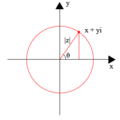Complex plane
In mathematics, the complex plane is used to help visualize complex numbers. The vertical line is called the imaginary axis, and the horizontal line is called the real axis. Any complex number can be written as a+bi, where a and b are real numbers, and i is the principal square root of -1. In the complex plane, you go a spaces on the real axis, and b spaces on the imaginary axis. The complex plane can also be expressed in the form of polar coordinates, where the size of the line is equal to the square root of a squared plus b squared, and the direction is an angle.
The complex plane can be used to draw the graphs of some functions, called complex functions, that can be used to study all kinds of things, like cars, airplanes, atoms and electricity.
Complex conjugates
Every complex number z=a+bi has a complex conjugate. It is written as [math]\displaystyle{ \overline{z} }[/math] and is equal to a-bi.[1][2] The complex number and its conjugate can be represented on the complex plane—as mirror opposites about the real axis.
Complex Plane Media
The complex plane. The horizontal axis represents the real numbers (\R), the vertical axis represents the imaginary numbers (\mathbb{I}). The complex number 4+4i is shown at the point (4,4).
Geometric representation of the complex-valued point z = x + yi in the complex plane. The distance along the line from the origin to the point z = x + yi is the Template:Dfn or Template:Dfn of z. The angle θ is the Template:Dfn of z.
Riemann sphere which maps all points on a sphere except one to all points on the complex plane
Mandelbrot fractal, imaged on a complex plane
Related pages
References
- ↑ "Comprehensive List of Algebra Symbols". Math Vault. 2020-03-25. Retrieved 2020-08-31.
- ↑ Weisstein, Eric W. "Complex Conjugate". mathworld.wolfram.com. Retrieved 2020-08-31.





